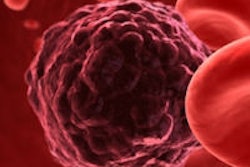Curcumin, the main component in the spice turmeric, suppresses a cell signaling pathway that drives the growth of head and neck cancer, according to a pilot study using human saliva by researchers at the University of California, Los Angeles (UCLA) Jonsson Comprehensive Cancer Center (Clinical Cancer Research, September 15, 2011, Vol. 17:18).
This study is a follow-on to previous research by the same group showing the potential for saliva to suppress the growth of head and neck cancer cells.
The inhibition of the cell signaling pathway also correlated with reduced expression of a number of pro-inflammatory cytokines, or signaling molecules, in the saliva that promote cancer growth, said senior study author Marilene Wang, MD, a professor of head and neck surgery and a Jonsson Cancer Center researcher.
"This study shows that curcumin can work in the mouths of patients with head and neck malignancies and reduce activities that promote cancer growth," Dr. Wang said. "And it not only affected the cancer by inhibiting a critical cell signaling pathway, it also affected the saliva itself by reducing pro-inflammatory cytokines within the saliva."
Turmeric is a naturally occurring spice widely used in South Asian and Middle Eastern cooking and has long been known to have medicinal properties, attributed to its anti-inflammatory effects. In India, women for years have been using turmeric as an antiaging agent rubbed into their skin to treat cramps during menstruation and as a poultice on the skin to promote wound healing.
A 2005 study by Dr. Wang and her team first showed that curcumin suppressed the growth of head and neck cancer, first in cells and then in mouse models. In the animal studies, the curcumin was applied directly onto the tumors in paste form. In a 2010 study, also done in cells and mouse models, the research team found that the curcumin suppressed head and neck cancer growth by regulating cell cycling.
The curcumin binds to and prevents an enzyme known as IKK, an inhibitor of kappa β kinase, from activating a transcription factor called nuclear factor kappa β (NFκβ), which promotes cancer growth.
In this study, 21 patients with head and neck cancers gave samples of their saliva before and after chewing two curcumin tablets totaling 1,000 mg. One hour later, another sample of saliva was taken and proteins were extracted and IKKβ kinase activity measured. Thirteen subjects with tooth decay and five healthy subjects were used as controls, Dr. Wang said.
Eating the curcumin, put it in contact not just with the cancer but also with the saliva, and the researchers found it reduced the level of cancer-enhancing cytokines, Dr. Wang said.
"The curcumin had a significant inhibitory effect, blocking two different drivers of head and neck cancer growth," Dr. Wang said. "We believe curcumin could be combined with other treatments such as chemotherapy and radiation to treat head and neck cancer. It also could perhaps be given to patients at high risk for developing head and neck cancers," such as smokers, those who chew tobacco, and people with human papillomavirus (HPV) -- as well as to patients with previous oral cancers to fight recurrence."
The curcumin was well tolerated by the patients and resulted in no toxic effects, the researchers noted. The biggest problem was their mouths and teeth turned bright yellow.
The next step for Wang and her team is to treat patients with curcumin for longer periods of time to see if the inhibitory effects can be increased. They plan to treat cancer patients scheduled for surgery for a few weeks prior to their procedure. They'll take a biopsy before the curcumin is started, then at the time of surgery and analyze the tissue to look for differences.



















